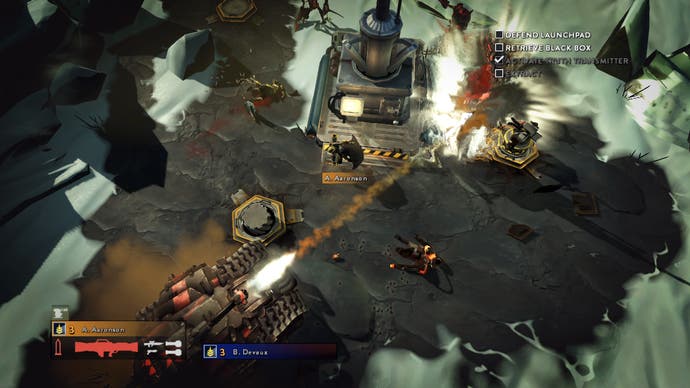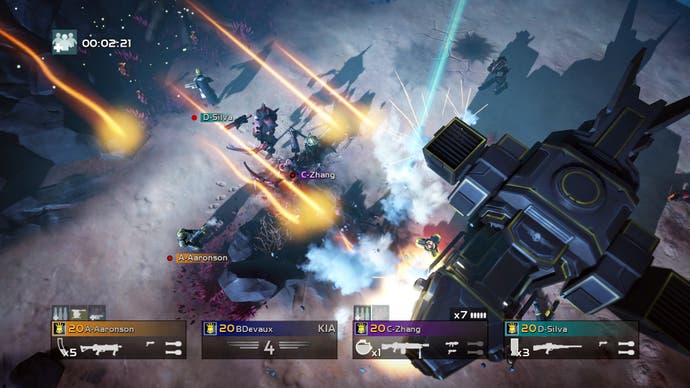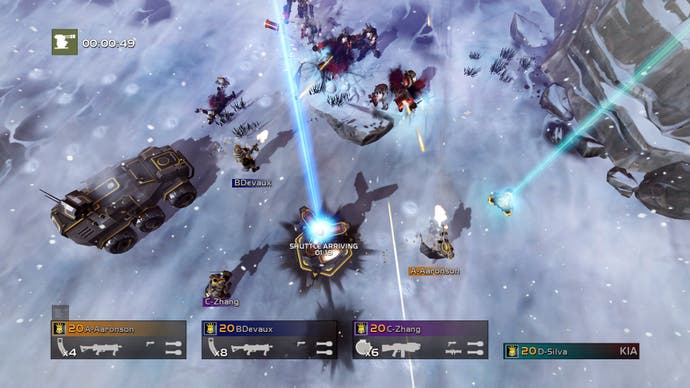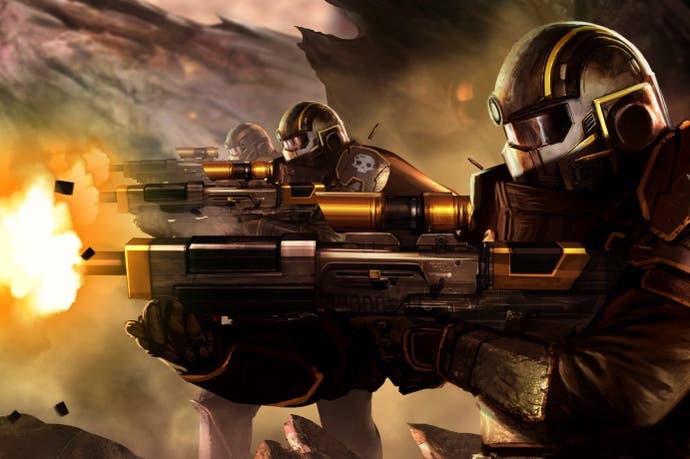Helldivers review
Orbituary.
In the future, social anxiety will be weaponised. That is to say, in the future, social anxiety will have a lot to do with whatever weapons you'll be carrying around. Helldivers is a top-down shooter for up to four players, and it sees you blasting your way through procedurally-generated alien worlds as a cheery space fascist, spreading Managed Democracy across the universe. So far, so Heinlein. But this is also the latest game from Magicka developer Arrowhead Game Studios - a studio, right, whose logo shows an arrow going through somebody's head. In other words, you should expect a few quirks. The biggest of these is friendly fire: it is so terribly easy to shoot your own team-mates in Helldivers. It's so terribly easy to be shot by your own team-mates. Or stepped on by them if they've unlocked mechs. Hell really is other people.
Friendly fire's what I fear when I drop into play, screaming out of orbit, gun ready, grenades primed. I'm not worried about the bug hunt, although it's relentless. I'm not worried about my part in a wider galactic war, or even the obvious ethical problems with my mission. I'm worried about the inevitable court-martial - or game boot - when I do something stupid. Stupidity can be terribly swift, too. The other day I decided to head into multiplayer, and I landed in a map just as a heroic Helldiving stranger was finishing off what had clearly been an epic one-man stand while he waited for evac. Sadly, dear reader, I squashed him flat with my falling Hellpod. It is hard to make up for something like that, so I simply leapt into the evac ship that he had called, and disappeared back into single-player as swiftly as I could.
Multiplayer is full of this stuff. Helldivers is ultimately a game about panic: your four-man team is never landing on a planet to wipe out all members of the game's three alien races and clear the map. Instead, you're there to do purposefully infuriating little missions - readying a missile launcher, priming an oil pump, escorting survivors to a bunker, protecting a rocket as it prepares to launch. Whatever shape they take, missions generally involve frantic matching of complex d-pad prompts as you interact with terminals - if you're familiar with the brew-your-own-spells system that brings Magicka to chaotic life, you'll know the kind of dexterity that's required - and then a lot of waiting around while a timer ticks down. It's all about busywork and holding territory as you fend off waves of critters of varying sizes. These critters come at you endlessly, too. You will never clear them all. You just have to plug away at them as efficiently as you can, taking them out before they raise the alarm, prioritising the bigger guys over the smaller guys, and not shooting any friendlies as you go. Total panic. If you don't take a few comrades with you when you expire, you're not really playing Helldivers as it's meant to be played.

Needless to say, multiplayer is the heart of the game. It's where the real tension lurks, as you try to not be the guy who scrubs the mission three mini-objectives in. Multiplayer's pretty wonderfully supported, too, offering local play and online match-making with a minimum of fuss. (Speaking of which, it offers cross-play in a similarly elegant manner, and your progress is carried across between platforms with few hiccups, as far as I can tell.)
Single-player isn't a wash-out, however. It's just different. The rules are the same, the missions are unchanged, and it's still all about those waves, but the emphasis is completely distinct. After all, you can chug through pretty much anything the game throws at you with four well coordinated players. As a lone wolf, you need to be a lot more strategic.
So strategic, in fact, that Helldivers becomes something of a puzzle game if you choose to go solo on higher difficulties. Suddenly, the loadouts you take into battle with you make a huge difference to your chances of success. Equally, you'll need to think about how your gear clips together with the missions you're facing in each level. You'll even need to think about how it affects the order in which you should tackle those missions.
Example. While Helldivers basically operates like a fancy twin-stick shooter, the endless ammo of Robotron is but a distant memory. Clips are short and stringently rationed. You have a back-up weapon and a melee move, but a lot of your offensive options come in the form of stratagems: equipment, abilities or specific one-shot attacks that you can call down to the field by entering - you guessed it - a complex string of d-pad commands. Think of it as military supplies delivered by Amazon Prime. Need a nuke dropped off to level an alien hive? Call in the stratagem and wait it out. Need a turret? A mech? An ammo dump? A flame thrower? Get on that d-pad.

Stratagem slots are limited in your loadout, but even if you pick the right ones for the mission in hand, you can still stuff it up royally on the ground. That machine gun I like to request when the enemies get a bit too busy is great for crowd control, but it can be deadly during the long wait for end-of-mission evac because the reload on it takes forever. Much better to go for an auto-turret or a mech in that situation. Neither of these are perfect, of course, since Helldivers has admirable balance across its nastier treats. That mech has the turning circle of a 1951 Nash Statesman - i.e., not good - and you need to get out of it to interact with terminals. The auto-turret has a nice aim, but you need to go prone when it fires, as it will rip you to pieces if you get between it and its prey. You can't really do anything when you're prone, of course, except elbow yourself around as the local wildlife chews your legs off. Choices, choices, choices. So many ways to screw up in Helldivers. So many ways to die, but there will only ever one thing to blame: human error.
Unlocking stratagems and weapons and perks for your loadout is a big part of the long-game appeal here, as is levelling up and plugging research points into your deadly tools to make them work a little bit better. This is good stuff by itself, of course, as Helldivers has some wonderful toys, not least a shotgun with a lovely wide scatter and amazing metallic audio that ranks it amongst one of my favourite video game blasters of the last few years. Helldivers has other plans beyond this, though, and while they're slightly cumbersome to get your head around, they underline the genuine care that Arrowhead has brought to this project.

And so the real long-game appeal lies in the Galactic War, a system that's fuelled by both single-player and multiplayer progression, and which sees the entire community reaching out from a central Super Earth in a bid to wipe out the game's three alien races. You do this by completing levels to conquer planets that are spread across different regions of space. Each planet has its own difficulty setting and its own reward in terms of an unlock, and if successfully overrun, it will give you a handful of influence points that go towards the overall effort and the push towards each alien home world. In reality, there's not that much to worry about - just play your missions and you're contributing to a bit of persistent fun for everyone - but it does give the game a real sense of character as the galactic map ripples back and forth in terms of ownership, and you're occasionally called in to either storm an alien stronghold or defend your own home.
The first Galactic War ended halfway through this review, incidentally, and it didn't end well. Super Earth fell to the alien hordes, the credits rolled, and then the whole thing reset. I can't blame the alien hordes, really: with our jackboots and four-person tanks, it's hard to pretend that you're playing as the good guy here. (Even within the ranks of the baddies it's still possible to be especially naff, incidentally. Stumbling and frequently confused, I would pitch my own contribution to the war effort somewhere between tragic and accidentally subversive.)
All of this stuff is powered by procedural generation, as missions spin up their own little arenas, spread across a range of terrain types, all of them bleak but starkly pretty, from wind-swept deserts to rotting jungles. The enemies themselves aren't bad, either, scaling from crustacean-themed bugs to spindly, blown-glass robots, each with their own quirks. The star of the show isn't your foes, though, and it certainly isn't the fascist 'goodies' you're cast as in this knockabout imperialist satire. The star of the show is the panic that's generated as you head into adventure, knowing that you're this close to screwing everything up for your team in a darkly hilarious manner.



